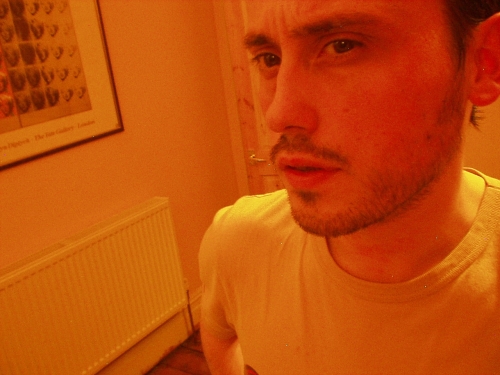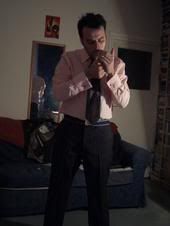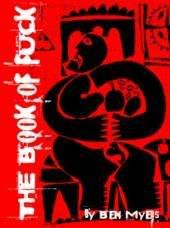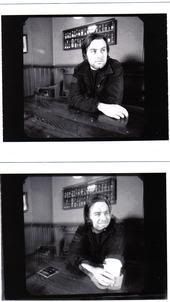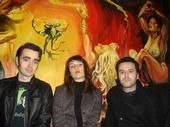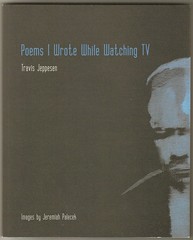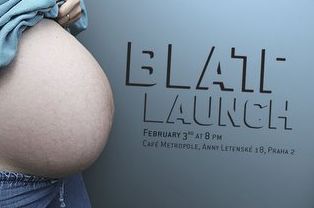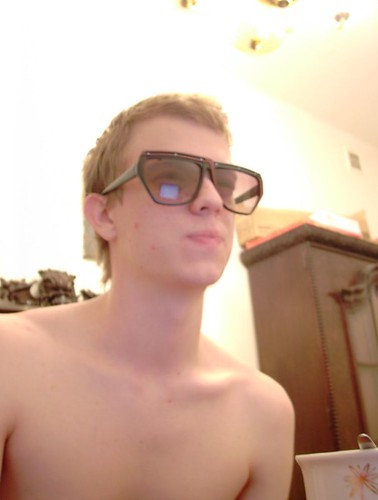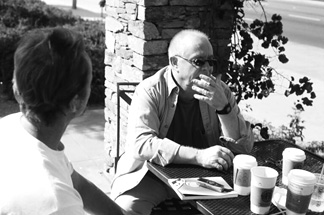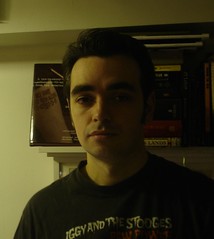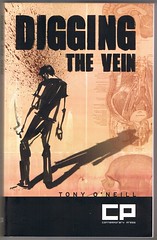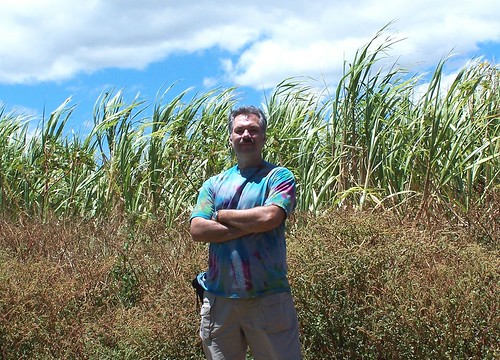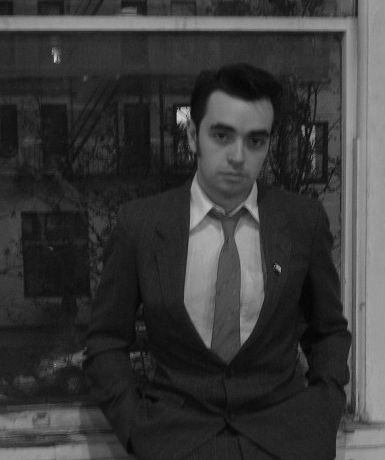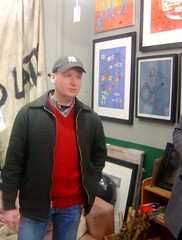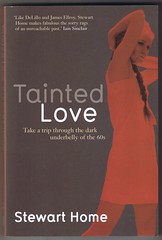You also have to remember that I don’t just do one style, I switch around and experiment, which confuses people in the trade because they’re used to authors who can’t or won’t write in more than one way. It’s definitely not commercial to change your style as radically as I do between different books. A lot of people who liked my early novels, all written in the third person and in a self-consciously pulp-splatter style, were very pissed off when I dropped the simulations of narratives in my fiction and published
Come Before Christ & Murder Love. I’d always been interested in experimental writing, but the fact that Alain Robbe-Grillet, for example, had always been a big influence on me, wasn’t picked up by the critics until I did that book. But I was always, even in my earliest fiction, among other things, writing about writing. Perhaps not bizarrely, my most commercially successful novel prior to
Tainted Love was
69 Things To Do With A Dead Princess, which on completely goes against the grain of the ‘mainstream’ sensibility.
Dead Princess sells because people who grew on fifties and sixties experimental writing (a lot of whom weren’t born until the sixties and even seventies) aren’t at all well served by the publishing industry these days. That book also continues to sell well because it’s been picked up by people teaching English at universities. They teach Burroughs and Beckett and they’re really pleased to be able to set their students a contemporary book with lots of modernist tropes which have been twisted to reflect the way the culture has developed and atrophied. There is still a lot of interest in non-narrative literary explorations, but most publishers just won’t cater for it. Therefore if you can sneak a book into print that doesn’t patronise the reader, doesn’t assume they are thick, then despite the fact that according to the those running publishing houses it’s uncommercial, it is potentially an extremely commercial proposition if it’s well done – and
Dead Princess is very well done – because there is absolutely no contemporary competition. But on the basis of the criteria used by the trade,
Tainted Love is undoubtedly my most ‘mainstream’ book since
Slow Death. Those two books and my first novel
Pure Mania are generally judged to have the potential widest appeal by editors. But I don’t think too much about that sort of thing, I just write the books I want to write. Some are easier for the trade to deal with than others. I just do what I think is right for the book. I also like the challenge of trying new things.
LR: Is the sixties as a cultural influence over for us?
SH: It depends on what you mean by the sixties. The whole stoner culture which came out of the sixties, and which my mother was very much a part of, permeates everything these days, not just records but TV and cinema. But a lot of the more interesting literary and cinematic experimentation has been dumped. Most people’s idea of non-linear these days is more MTV than
Last Year At Marienbad or
Ann Quin. But people are increasingly bored with the blanding out of the culture that’s been going on for some time, there will be a resurgence, reinvention, redeployment and some completely unexpected new developments of all the best things about sixties modernism. It’s a matter of using elements of sixties culture to do something new, not simply replicating them. And it’s not really just the sixties we’re talking about. It’s about recognising we all have a stake in modernity, and moving on and off from that. So what really interests me is modernism as a whole, not just in its sixties guise, and in a lot of ways I’m most interesting in taking that up from where people like
Rudy Ray More left off, fucking with the conventions and doing so with both attitude and humour. What we need to get away from is the obsession with cultural objects, so that we can put the focus back on the social relations within specific communities and between groups of people from which cultural forms emerge. The cultural industry will have to take this onboard eventually, because in its obsession with gaining the largest possible audience for a small number of cultural objects, it is ultimately on a hiding to nowhere. A book or whatever that is put together in the hope that it will appeal to everyone, ultimately appeals to no one. It misses the mark by aiming too wide. That’s what the current blanding out is all about, it entails removing all the elements that appeal to specific readers because these might be found difficult or offensive by someone else. People end up having best-sellers foisted on them rather than books they’d actually enjoy reading. It’s the mental equivalent of junk food. People don’t develop if they don’t read things that challenge them, that they disagree with, that they find disagreeable. You haven’t grown up until you’ve understood the value of reading a bad book, and the trade sells itself on enjoyment, on not offending. I read shitloads of books I dislike, and watch shitloads of films I think are shit, because I’m continuously educating myself. If you read something you disagree with, it can force you to develop and sharpen your positions, if you only read writers whose opinions you agree with then you’re not going anywhere.
LR: Do you see the writing/publishing of the memoir as a worthwhile literary form?
SH: I wrote
Tainted Love precisely because I don’t find most memoirs worthwhile. They’re formulaic, particularly the celebrity memoir or autobiography. I wanted to create the double of the memoir, something with a twist and that recorded a genuinely interesting life. Celebrities are never interesting, they’ve become pure image with all their humanity removed from them, celebrities are just an abstraction of what it is to be human and their pseudo-lives aren’t of interest to me at all. I’m more interested in people who can’t afford to do rehab in The Priory, but unfortunately it’s the rich and famous who most usually get their memoirs published. Not all memoirs are bad, and since we’re dealing with the sixties I might as well mention some examples which address that era. I thought
Brian Barritt’s autobiography
The Road Of Excess was very interesting as far as it went. The problem with the book is that because Barritt wants to be perceived as a psychedelic warrior, he doesn’t really detail his involvement in a whole range of drug dealing, and knowing about this makes a bit more sense of his life. Barritt only really touches on stuff like pot and LSD which are acceptable to weekend hippies, although he does at least mention his smack use. He’s also very funny on
Alex Trocchi, so the book is well worth reading despite a few reservations. I also liked parts of Hammond Guthrie’s
AsEverWas: Memoirs of a Beat Survivor. He’s very good on the early psychedelic scene in California, some great stuff about the scene there, I’m not so interested in his juvenile pranks or the breakdown of his marriage, but he writes well.
LR: As most of your fiction is an
anti-narrative, is
Tainted Love an anti-memoir?
SH: It’s definitely an anti-memoir, and it’s more truthful than most memoirs because it presents itself as an anti-novel, as fiction. Probably more of the book is literally true than most people would imagine, but it wasn’t possible to tell the whole story because the guilty must be protected, in part because of the ridiculously stringent libel laws in the UK. One day, perhaps, the whole story can come out. But that said, my novel is a far better approximation of ‘truth’ than any ghost-written ‘autobiography’ that presents itself as ‘non-fiction’.
LR: Patti Smith is ostensibly an influence. Discuss.
SH: I was telling someone the other day that I acquired Patti Smith’s first album
Horses when I was fourteen, and the woman I was talking to said that was very early, and I replied that the album came out in 1975, the year before, so it wasn’t that early. I always thought Patti Smith was hilarious, like all her shit about. It was so pretentious, in the literal meaning of the term, that I just loved it. Patti Smith was speaking in tongues, and she didn’t seem to know what the fuck she was singing about. But the spirit was great. I loved "Gloria" and "Land" on that first album. The sound was perfect, but she sure as hell wasn’t hip, like she could have gone for
Villon, or someone, but no Patti opts for absolutely the most obvious romantic poetic cliché in the form of
Rimbaud. If she’d been less pretentious, if she’d actually known what the fuck she was talking about, she wouldn’t have been as good. I loved "Piss Factory" and her version of "Hey Joe", but when I was a teenager back in the late seventies for me the best thing she’d done was the live version of
The Who’s My Generation. I’d just crack up every time I heard her scream ‘John Cale bass guitar solo’ and you’d get about two notes. At that time I also got hold of the
Nuggets double compilation album put together by her guitarist Lenny Kaye, and that was a revelation, all those groovy garage punk classics from the sixties by
The Electric Prunes and The Seeds, I loved that stuff when I was teenage. As soon as
The Pebbles albums started coming out, I got those too, from
Pebbles 1 onwards. The sixties seemed so long ago to me then, like it was the stone-age, although those garage punk recordings were only a decade old. Back then, those recordings felt to me to be a lot older than stuff that came out in the late-seventies sounds to my ears now. Even the sixties sounds like yesterday now, whereas when I was fourteen or fifteen I thought stuff from 1966 sounded positively antediluvian.
LR: Are there any writers you admire who you feel do not get the attention they deserve?
SH: There are lots, and among contemporary writers I think
Lynne Tillman stands out in particular as someone who really ought to be much more widely read than she is at present. Her new novel
American Genius is coming out on
Soft Skull, I’m really looking forward to reading that. My favourite Tillman book is
Cast In Doubt, which is about a gay writer called Horace and his obsession with a girl whose disappeared called Helen. On a meta-level Horace represents classicism or modernism, and Helen stands for romanticism or post-modernism. So the book is all about Horace’s quest for Helen and his inability to find her, and the complete meaninglessness of her diary to him when he acquires that. But Lynne has done a lot of really good books. Anything by her is worth reading, fiction or non-fiction. To take just one more writer, an older one this time, I really like
Clarence Cooper Junior, who
Canongate republished in their Payback series of classic black writing about ten years ago, but I think he’s out of print in the UK. No doubt you can pick him up used or on import. A lot of people think Cooper’s last novel
The Farm is his best. It’s about being forced to clean up from heroin addiction as a con, and his sexual and other obsessions that accompany this, the minutiae and inhumanity of prison life etc. It’s fairly autobiographical but Cooper presents it as a novel.
The Farm is a stunning piece of writing, but I also really like his earlier books too.
LR: What next? Are there any more novels on the way?
SH: In terms of writing, I have a novel I wrote before
Tainted Love that still isn’t published called "Memphis Underground". There was an independent publisher interested in that, but it contains four basic strands and the editor I was dealt with only liked three of them, so he wanted me to remove the final strand and replace it with something else. I didn’t want to do that, so this novel will come out when I find a publisher who likes all of what I’ve done with it. The first half "Memphis Underground" uses that classic sci-fi device of cutting two narratives together which turn out to be the same person’s life six months apart, so in the second of the cut narratives he’s taken on another identity. It’s about all sorts of things but other than using this sci-fi trope, it isn’t science fiction. I’ve got another novel I’ve done called "Mandy, Charlie & Mary-Jane", which is about a drug-addled college lecturer who turns into a serial killer. I want to do some revisions on that, but it’s written in draft form. I’ve also done a non-fiction biography of my mother, but I’m not ready to publish that yet because of potential legal problems. So that will have to sit in a draw until certain people have died, it could come out in two years time, or it might have to wait twenty-years before there’s any chance of it being published. Sometime within the next year I’m also planning to start work on a new novel called "Blood Rites of the Bourgeoisie", it will be set in the contemporary art world. However, I’m also learning ventriloquism. I just got a £8800 grant from the Live Art Development Agency, which enables me to take time out to learn some new skills. I’m exited about the prospect of presenting readings from my fiction wrapped into a ventriloquist act. That’s what’s really keeping me busy right now. I love ventriloquist dummies, they’re such an archetypal symbol of modernism…
LR: Stewart, welcome to
scarecrow, and thanks for your time…

